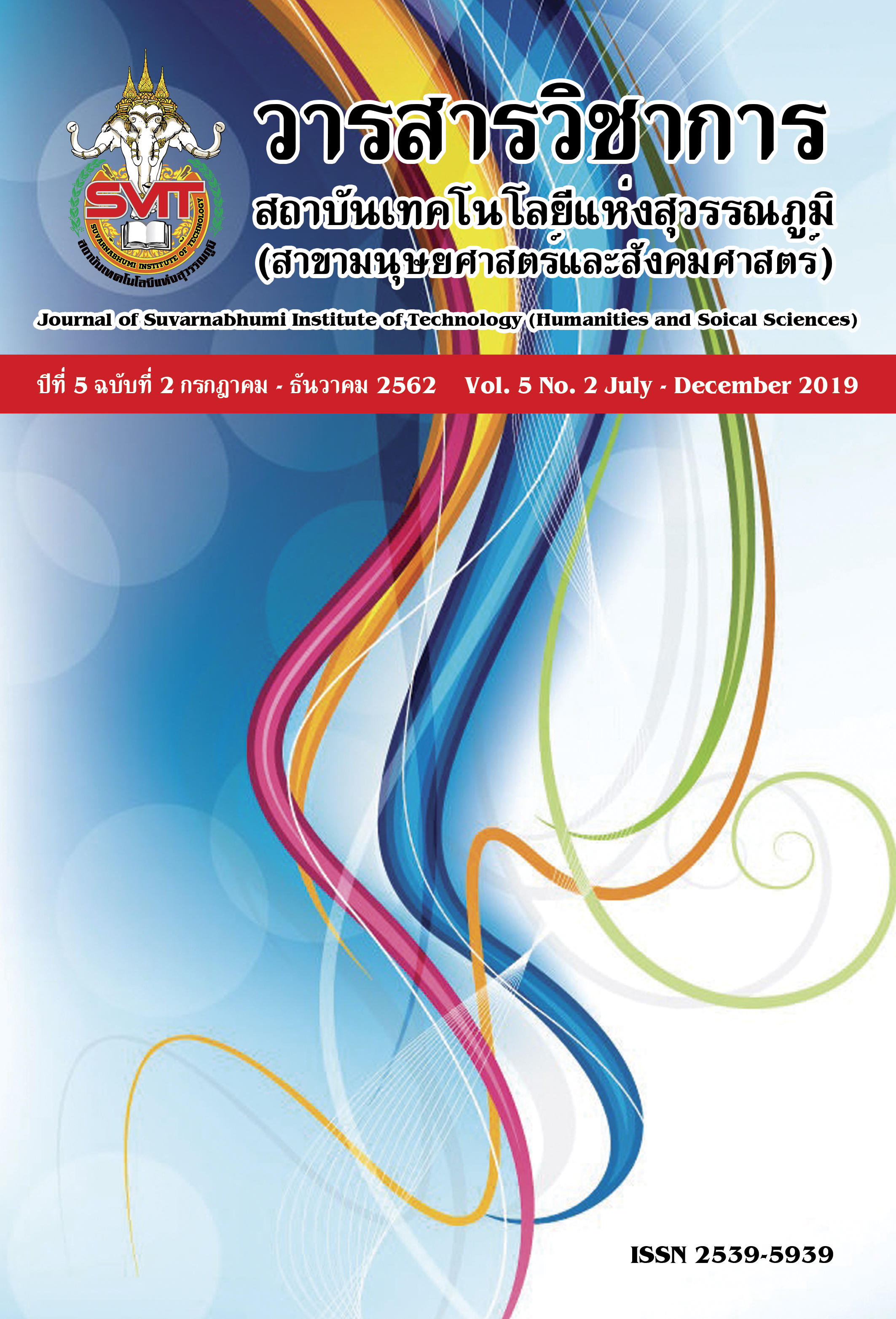PERSONALITY CHARACTERISTICS OF THE LEADER OF THE SUB-DISTRICT SUB-DISTRICT HEADMAN AND VILLAGE HEADMEN AFFECTING COMMUNITY EMPOWERMENT OF PEOPLE IN UTHAI DISTRICT AREA PHRA NAKHON SI AYUTTHAYA
Keywords:
characteristics, leadership personality, community empowermentAbstract
The objectives of the study were 1) to study the leadership personality characteristics of the subdistrict headman and the village headman in Uthai district, Phra Nakhon Si Ayutthaya province; 2) to study the community empowerment in Uthai district, Phra Nakhon Si Ayutthaya province; 3) to compare the community empowerment in Uthai district, Phra Nakhon Si Ayutthaya classified by personal factors; 4) to study the relationship between the leadership personality characteristics of the subdistrict headman and the village headman and the community empowerment in Uthai district, Phra Nakhon Si Ayutthaya province; and 5) to study the leadership personality characteristics affecting the community empowerment in Uthai district, Phra Nakhon Si Ayutthaya province. The study was a quantitative research. The population used in the study were 46,148 people from 11 subdistricts in Uthai district, Phra Nakhon Si Ayutthaya province. The sample size was determined using Taro Yamane (Yamane, 1973) formula, with the numbers of sample of 397 people. The sample was selected using accidental random sampling. The instrument used in research was survey questionnaires. The statistics used in data analysis were frequency, percentage, mean, standard deviation, t – test and F – test. When the differences were found, a pair comparison would be done by Scheffe’ test, Pearson's correlation coefficient, and multiple regression analysis.
The findings of the study were as follows:
- The personal data of respondents were found that the majority of respondents were male, 221 people or 55.7 percent, followed by female, 176 people or 44.3 percent. The majority of the respondents; were over 40 years old, 162 people or 40.8 percent; had an upper secondary education/a certificate of vocational education, 224 people or 56.4 percent; were merchants/self-employed, 152 people or 38.3 percent; and earned income in between 15,001 – 30,000 baht, 191 people or 48.2 percent.
- The leadership personality characteristics of the subdistrict headman and the village headman as a whole were at a high level (: 3.68, S.D. = 0.16). Considering in individual aspect was found that aspect of sociability had a high level of average and was the highest average, followed by the aspect of being deliberate had a high level of average, the aspect of being gentle and relaxing had a high level of average, the aspect of getting ready for new experience had a high level of average, and the aspect of being anxious had a medium level of average and was the least average, respectively.
- The level of community empowerment in Uthai district, Phra Nakhon Si Ayutthaya as a whole were at a high level (: 4.00, S.D. = 0.20). Considering in individual aspect, it was found that all aspects were at the high level of average. The aspect of empowering people to unite had the highest average, followed by the aspect of people’s working power creation, and the aspect of empowering the right mindset to people had the least average, respectively.
- The comparison of the community empowerment in Uthai district, Phra Nakhon Si Ayutthaya classified by personal factors indicated that the difference in occupation gave the different community empowerment with statistical significance at the level of 0.05. And the differences in personal data, consisting of gender, age, education level, and income gave no difference in the community empowerment.
- The results of the intraclass correlation coefficient analysis among the variables of the leadership personality characteristics of the subdistrict headman and the village headman on the community empowerment showed that the correlation values ranged between 0.130 - 0.370. It was found that the variables those had the highest relationship to one another were the personal characteristics in the aspect of sociability (X5), which positively correlated with the community empowerment in terms of empowering the right mindset to people (Y1) with statistical significance at the level of 0.01. (rxy = 0.370**).
- The results of the leadership personality characteristics affecting the community empowerment in Uthai district, Phra Nakhon Si Ayutthaya province revealed that the personal characteristics in the aspect of sociability (X5) affected to the community empowerment in terms of empowering people to unite with statistical significance at the level of 0.01 and the correlation coefficient of 0.256. Where the aspect of being deliberate (X1), the aspect of being gentle and relaxing (X2), the aspect of being anxious (X3), and the aspect of getting ready for new experience (X4) affected to the community empowerment with no statistical significance. And enabled to forecast the personal characteristics affecting the community empowerment by 66 percent. The forecasting equation could be written in standard-score form as ZY = 0.234 (X5) + - 0.019 (X3) + -0.024 (X4) + 0.028 (X1) + -0.093 (X2)
References
ชรินทร์ มิ่งขวัญ. (2552). การมีส่วนร่วมของผู้นำชุมชนในการพัฒนาท้องถิ่นในเขตองค์การบริหารส่วนตำบลตลิ่งชัน อำเภอท่าศาลา จังหวัดนครศรีธรรมราช. การค้นคว้าอิสระส่วนหนึ่งของการศึกษาตามหลักสูตร ปริญญารัฐประศาสนศาสตรมหาบัณฑิต สาขาวิชารัฐประศาสนศาสตร์, บัณฑิตวิทยาลัย, มหาวิทยาลัยราชภัฏวไลยอลงกรณ์ ในพระบรมราชูปถัมภ์ จังหวัดปทุมธานี.
นันทพร ตรีคุณา. (2560). การเสริมพลังการทำงานของกำนัน ผู้ใหญ่บ้าน จังหวัดพระนครศรีอยุธยา. วิทยานิพนธ์ส่วนหนึ่งของการศึกษาตามหลักสูตรปริญญารัฐประศาสนศาสตรมหาบัณฑิต สาขาวิชารัฐประศาสนศาสตร์ มหาวิทยาลัยราชภัฏพระนครศรีอยุธยา.
พิบูล ทีปะปาล. (2550). พฤติกรรมองค์การสมัยใหม่. กรุงเทพฯ: อมรการพิมพ์.
ภาวินี เพชรสว่าง. (2559). พฤติกรรมองค์การ. พิมพ์ครั้งที่ 5. กรุงเทพฯ: โรงพิมพ์ ซีวีแอล การพิมพ์.
รัฐพล ล้อประกานต์สิทธิ์. (2559). คุณลักษณะภาวะผู้นำของพนักงานองค์การบริหารส่วนตำบลในเขตอำเภอด่านมะขามเตี้ย จังหวัดกาญจนบุรี. การค้นคว้าอิสระนี้เป็นส่วนหนึ่งของการศึกษาตามหลักสูตรปริญญารัฐประศาสนศาสตรมหาบัณฑิต สาขาวิชาการบริหารการจัดการภาครัฐ, วิทยาลัยเทคโนโลยีสยาม.
วิรัช วิรัชนิภาวรรณ. (2552). การบริหารจัดการตามแนวทางคุณธรรมและแนวทงเศรษฐกิจพอเพียง. กรุงเทพฯ: โฟร์เพซ.
ศรีพนา ศรีเชื้อ. (2556). การศึกษาภาวะผู้นำของข้าราชการทหารอากาศสังกัดกรมสวัสดิการทหารอากาศ. ภาคนิพนธ์นี้เป็นส่วนหนึ่งของการศึกษาตามหลักสูตรปริญญารัฐประศาสนศาสตรมหาบัณฑิตสาขาวิชาการจัดการเพื่อความมั่นคง, บัณฑิตวิทยาลัย, มหาวิทยาลัยราชภัฏวไลยอลงกรณ์
ในพระบรมราชูปถัมภ์ จังหวัดปทุมธานี
Cronbach. (1990). Essentials of psychological testing. (5th ed.). New York: Harper & Row.
Taro Yamane. (1967). Statistics: An Introductory. (3rd. Ed.) New York. Harper and Row Publications.
Downloads
Published
Issue
Section
License
The articles published are copyrighted by the Sarasas Journal of Humanities and Social Science. The opinions expressed in each article in this academic journal are those of the individual authors and do not reflect the views of Sarasas Suvarnabhumi Institute of Technology. The authors are solely responsible for all aspects of their respective articles. Any errors or inaccuracies in the articles are the sole responsibility of the authors.



